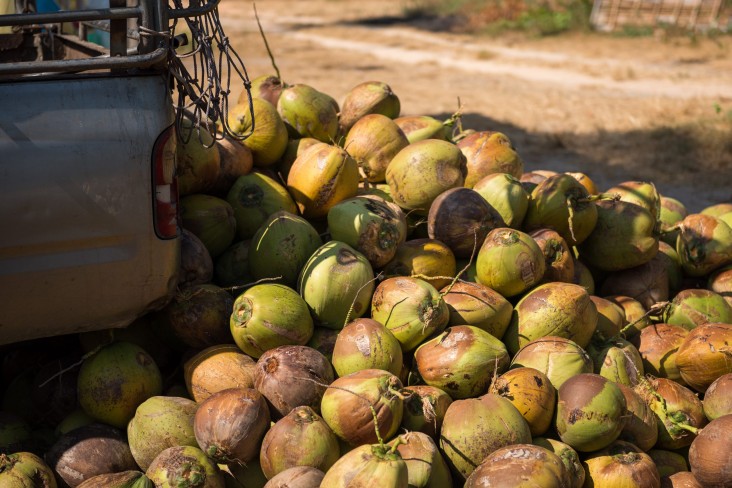Speeches Shim

BANGKOK – Over one year after an inaugural sustainable coconut roundtable was held in Malaysia, the United States Agency for International Development (USAID) and global cacao corporate, Barry Callebaut, reconvened coconut buyers via webinar on June 30 to continue efforts to prevent a global coconut shortfall through a sustainable sourcing charter.
Sustainable sourcing – reducing the social and environmental fallout from coconut production – promises to increase climate-smart coconuts in an industry where demand far outstrips supply.
The global coconut market is valued at $11.6 billion in 2020 and is expected to reach $19.2 billion by the end of 2026, according to one market analysis. Despite double-digit year-on-year growth in demand, supply is growing at only near 1 percent annually, creating a gap that threatens supply chains of more than 100 products spanning food to pharmaceuticals. Supply has long been hobbled by natural hazards, farmers’ lack of technical know-how and high production costs. Asia’s supply is projected to plummet by 80 percent by 2027 without adequate investment.
In 2019, Barry Callebaut initiated efforts, supported by USAID, to draft the coconut industry’s first global sustainable coconut charter to harmonize buyer requirements, strengthen collaboration on sustainable coconut and coconut oil production, and boost supply and farmers’ incomes through training, improved access to markets, finance and technology. “Such a tool is a paramount step to reduce complexities of overlapping multiple definitions,” said Gregory Bardies, Barry Callebaut’s Asia Pacific Sustainability Manager. “Too many times have we seen commodities taking up to ten years to pre-align on pressing sustainability issues – and losing critical years of action. We are proud to say that we have done this [design coconut charter] in less than one year in true multi-stakeholder fashion,” he added.
Expected to launch later this year, some companies, including Barry Callebaut, are already using the charter to design coconut sustainability programs. “We will use the charter to work with all of our suppliers and design adequate interventions with the confidence that we have the right blueprint to answer the sector’s growing concerns,” said Bardies.
The recent webinar reviewed ongoing initiatives to rejuvenate coconut supply. Some 10 companies have sought to join a German government-funded public-private partnership to improve the sustainability of coconut and coconut oil production in the Philippines, one of the world’s top two growers (the other is Indonesia). The partnership has issued its “last call” for partners, said Matthias Radek, a chief advisor for GIZ Philippines.
Nestlé has committed to identifying the origin of 80 percent of coconut in its supply chain, and to responsible sourcing of at least 70 percent. It is collaborating with two other buyers to assess and share information about suppliers. “Coconut is a new category for us in responsible sourcing, but not much is known yet, so we will really benefit from the work coming out of the collaboration, which we will use to redefine our targets by the end of the year, hopefully,” said Madeleine Eilert, Nestlé’s sustainable sourcing leader for sugar and coconut.
Almost 80 participants from 39 companies/organizers joined the coconut virtual “roundtable” webinar, including some of coconuts’ largest global buyers and processors such as Barry Callebaut, Nestlé, Unilever and Cargill. Companies attending the roundtable on a regular basis are responsible for more than 40 percent of global coconut oil volumes.
“We are a strong supporter of industry movement towards sustainability. A charter is the key missing piece that can help ensure the industry is meeting the demand gap sustainably,” said Christy Owen, the head of USAID Green Invest Asia, which supports companies in Southeast Asia green their supply chains through finance, carbon accounting and technical advisory. The project is invested in a number of coconut product sustainability initiatives throughout the region.
The next sustainable coconut industry meeting is expected to take place in September/October, when organizers will finalize and formally launch the charter.

Comment
Make a general inquiry or suggest an improvement.